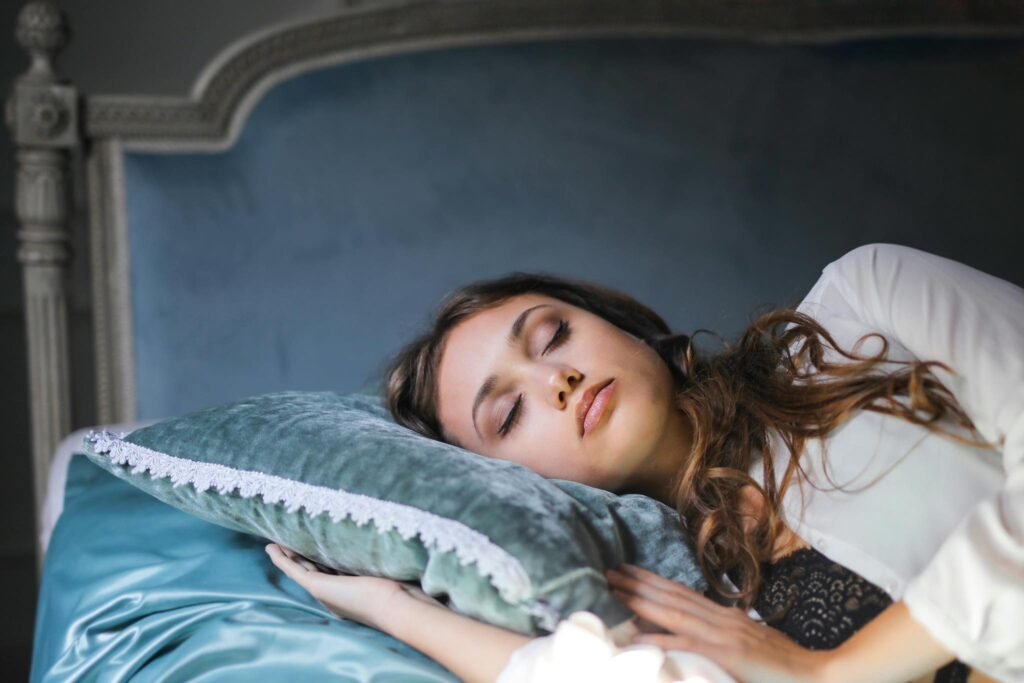You’ve heard “get your beauty sleep” a million times, but it’s not just a cute saying. Sleep is like a superpower for your skin, working behind the scenes to repair, hydrate, and refresh while you dream. Every night, your body dives into a cycle of sleep stages that directly affect how your skin heals, holds moisture, and churns out new cells. Mess with sleep, and your skin pays the price—think dullness, breakouts, or premature wrinkles. This article unpacks the science of how sleep stages boost skin health, spotlights the best nighttime skincare products, and shares easy practices to make your sleep a skin-saving ritual. Plus, there’s a Nightly Skin Log to track your progress.

Why Sleep Is Your Skin’s Best Friend
Your skin’s like a phone that needs to recharge overnight. While you’re snoozing, it’s busy fixing damage from the day—UV rays, pollution, or that accidental face-scratching moment. A 2023 Journal of Investigative Dermatology study says sleep ramps up skin repair by boosting blood flow, collagen production, and cell turnover. Skimp on sleep, and you’re left with a weaker skin barrier, less glow, and more puffiness. Cortisol, the stress hormone, spikes when you’re sleep-deprived, breaking down collagen and triggering zits, per a 2024 Sleep Medicine study. Basically, good sleep keeps your skin plump, clear, and young.
Dr. Whitney Bowe, a New York dermatologist, puts it simply: “Sleep is your skin’s reset button. Miss it, and you’re stuck on low battery.” Let’s break down how each sleep stage works its magic.
Sleep Stages and Skin Magic
Your night’s sleep isn’t one long nap—it’s a cycle of stages, each helping your skin in unique ways. You go through 4-6 cycles (about 90 minutes each) of non-REM and REM sleep, per a 2023 Nature Reviews Neuroscience study. Here’s how they team up for your skin.
Stage 1 & 2: Light Sleep, Skin Prep
In the first 10-20 minutes, you drift into light sleep. Your heart rate slows, and blood flow starts redirecting to your skin, delivering oxygen and nutrients. This preps your skin for deeper repair, like a warm-up for a workout. Stage 2 (about 50% of your sleep) boosts growth hormone release, which helps repair tiny skin tears from sun or pollution. A 2024 Journal of Clinical Sleep Medicine study says this stage also stabilizes your skin’s moisture barrier, locking in hydration so you don’t wake up flaky.
Skin Win: Improved hydration and early repair of daily damage.
Stage 3: Deep Sleep, The Repair Shop
Deep sleep (20-25% of your night) is where the real skin work happens. Around 1-2 hours into sleep, your body pumps out peak levels of growth hormone, which rebuilds collagen and elastin—your skin’s scaffolding. This stage also speeds up cell turnover, swapping out old, dull cells for fresh ones, per a 2023 Dermatologic Research study. Blood flow to your skin hits its max, flushing out toxins and reducing inflammation. Miss deep sleep (like from late-night scrolling), and you’ll see sagging, dark circles, or breakouts faster.
Collagen boost, faster cell turnover, and reduced puffiness.
REM Sleep: Glow Time
REM (rapid eye movement) sleep, about 20-25% of your night, kicks in later in each cycle. It’s when you dream, and your skin gets a glow-up. Your brain signals the release of melatonin, a powerful antioxidant that fights free radicals (nasty molecules from sun or smog that age skin). A 2024 Skin Research and Technology study says REM sleep also balances your skin’s pH, keeping it calm and less prone to redness. This stage is key for that “woke up like this” radiance.
Antioxidant protection and balanced, glowing skin.
What Happens When You Skimp on Sleep?
Pull an all-nighter, and your skin knows. A 2023 Sleep study found just one night of poor sleep (under 5 hours) spikes cortisol, which thins your skin barrier and slows healing. It also cuts moisture by 10%, leaving you dry and dull. Chronic sleep loss—say, 6 hours or less nightly—ages skin faster, with 30% more fine lines after a year, per a 2024 Journal of Aging Research. Puffiness and dark circles pop up because poor sleep messes with fluid drainage around your eyes. Even acne flares, as cortisol revs up oil production.
Dr. Mona Gohara, a Connecticut dermatologist, says, “Think of sleep as your skin’s nightly spa. Skip it, and you’re canceling your glow appointment.” So, how do you make sleep work harder for your skin?
Nighttime Skincare: Products That Boost Beauty Sleep
Your nighttime skincare routine is like giving your skin the right tools for its overnight shift. The goal? Support repair, lock in moisture, and fight aging while you sleep. Here’s what works, backed by science and dermatologists.
Cleanser: Start Fresh
Wash off the day’s grime—sweat, pollution, makeup—to let your skin breathe. A gentle, sulfate-free cleanser (like CeraVe Hydrating Cleanser) prevents irritation while keeping your skin’s barrier happy, per a 2023 Journal of Cosmetic Dermatology study. Avoid harsh soaps—they strip moisture and disrupt repair.
CeraVe Hydrating Cleanser or La Roche-Posay Toleriane Hydrating Gentle Cleanser.
Retinol or Peptides: Cell Turnover Champs
Retinol (vitamin A) speeds up cell turnover and boosts collagen during deep sleep, reducing fine lines and acne scars, per a 2024 Dermatologic Therapy study. Start with 0.025% retinol 2-3 times a week to avoid redness. If your skin’s sensitive, try peptides—they mimic growth hormone’s repair effects without irritation.
The Ordinary Retinol 0.2% in Squalane or Drunk Elephant A-Gloei Peptide Serum.
Moisturizer: Lock It In
Night creams with hyaluronic acid and ceramides trap water and rebuild your skin’s barrier, especially during light and deep sleep. A 2023 Nutrients study says ceramides cut dryness by 20% overnight. Look for thicker creams (not lightweight lotions) for max hydration.
Neutrogena Hydro Boost Gel-Cream or First Aid Beauty Ultra Repair Cream.
Antioxidants: Fight Free Radicals
Serums with vitamin C or niacinamide work with REM sleep’s melatonin to neutralize free radicals. A 2024 Skin Pharmacology study says 10% vitamin C fades dark spots and boosts glow by morning. Niacinamide calms redness and evens tone.
SkinCeuticals C E Ferulic or Paula’s Choice 10% Niacinamide Booster.
Eye Cream: Tackle Puffiness
Eye creams with caffeine or peptides reduce under-eye bags and dark circles by improving drainage during deep sleep. A 2023 Journal of Aesthetic Dermatology study says caffeine tightens blood vessels for less puffiness.
The Inkey List Caffeine Eye Cream or Kiehl’s Creamy Eye Treatment with Avocado.
Nighttime Skincare Practices: Set Your Skin Up for Success
Products are half the game—how you sleep and prep matters too. These habits make your beauty sleep count.
- Pillowcase Swap: Use silk or satin pillowcases to cut friction, which can cause creases and irritation. A 2024 Dermatologic Research study says silk reduces skin dryness by 15% compared to cotton. Wash pillowcases weekly to keep bacteria away.
- Sleep Position: Try sleeping on your back to avoid squishing your face, which can worsen wrinkles and puffiness, per a 2023 Journal of Clinical Sleep Medicine. It also helps skincare products stay on your skin, not your pillow.
- Humidifier: Run a cool-mist humidifier to add moisture to the air, preventing your skin from drying out during light sleep. A 2024 Environmental Dermatology study says humidifiers boost skin hydration by 25% overnight.
- Timing Matters: Apply skincare 30 minutes before bed so products sink in before you hit the pillow. Layer from thinnest (serum) to thickest (cream) for best absorption, per Dr. Bowe.
- Sleep Hygiene: Aim for 7-9 hours of sleep, starting before midnight to max out deep sleep. A 2023 Sleep Medicine study says consistent bedtimes improve skin repair by 20%. Dim lights and skip screens an hour before bed to boost melatonin.
External Factors: What Sabotages Beauty Sleep?
Your skin’s nightly glow-up isn’t just about sleep—outside factors can derail it. Stress keeps cortisol high, slowing repair and causing breakouts, per a 2024 Nutrients study. Late-night snacks (especially sugary ones) spike insulin, leading to oilier skin. Alcohol dehydrates, leaving your skin parched by morning. Even bedroom temperature matters—too hot, and you sweat, clogging pores; too cold, and your skin dries out. A 2023 Environmental Health study says 68-72°F is ideal for skin-friendly sleep.
Dr. Gohara says, “Your skin’s trying to work overnight, but stress and bad habits are like loud neighbors keeping it up.” Tweak these for better results.
Fixes:
- Meditate 5 minutes before bed to cut stress and cortisol.
- Skip sugary snacks after 8 p.m.; try almonds or yogurt.
- Drink water, not wine, in the evening to stay hydrated.
- Keep your bedroom at 68-72°F and use breathable bedding.
Nightly Skin Log: Track Your Beauty Sleep
Want to see how sleep transforms your skin? Use this Nightly Skin Log to track your routine and skin’s progress over a month. Jot down these daily or every few days, and share with a dermatologist if issues pop up.
- How’s your skin looking? (glowy, dry, puffy, breakout-prone)
- How’d you sleep? (hours, quality, deep or restless)
- What’s your nighttime routine? (cleanser, retinol, moisturizer, etc.)
- Any sleep disruptors? (stress, late coffee, hot room, screens)
- How’s your skin feeling? (smooth, tight, radiant, irritated)
Example Entry (Maya, Night 3):
- Skin: Slightly oily, one new zit, but glowy cheeks.
- Sleep: 7 hours, woke up once, felt deep.
- Routine: CeraVe cleanser, 0.2% retinol, Neutrogena Hydro Boost cream, silk pillowcase.
- Disruptors: Stress from work, forgot humidifier.
- Feelings: Hopeful—skin’s smoother than yesterday!
How to Use It:
- Log nightly for a week to spot patterns (e.g., poor sleep = dull skin).
- Tweak one thing (like adding a humidifier) and track changes.
- Check monthly to see long-term wins, like fewer breakouts or brighter skin.
Wrapping Up
Beauty sleep isn’t a myth—it’s your skin’s nightly repair crew, powered by sleep stages that rebuild collagen, boost glow, and lock in moisture. Light sleep preps, deep sleep repairs, and REM sleep adds radiance. Pair that with smart nighttime products—gentle cleansers, retinol, ceramide creams—and habits like silk pillowcases or a humidifier, and you’re giving your skin a head start. Stress, sugar, or bad sleep can sabotage it, but small fixes keep you on track. As Dr. Bowe says, “Your skin’s working hard while you sleep—give it the tools to shine.” Start your Nightly Skin Log tonight and watch your skin write a glowing new chapter.
